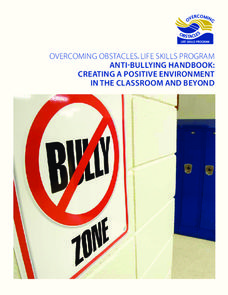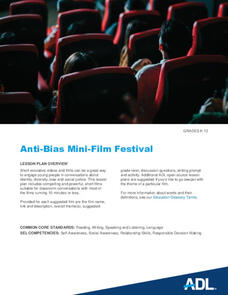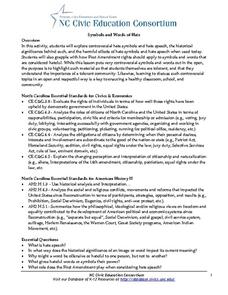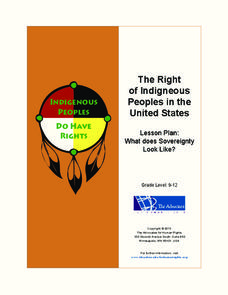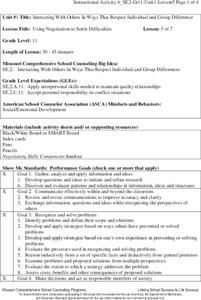Education Bureau of Hong Kong
Mental Models
Critical to responsible decision making is becoming aware pre-conceived notions and biases that influence our perceptions. A colorful slide presentations asks viewers to consider these mental models that factor into their assumptions and...
Overcoming Obstacles
Anti-Bullying Handbook: Creating a Positive Environment in the Classroom and Beyond
A hot-button topic in schools today is bullying, and although there is heightened awareness of this problem, information about specific steps schools can take to combat the problem and create a positive environment is difficult to find....
Facing History and Ourselves
Transcending Single Stories
The focus of the second lesson in the Standing Up for Democracy unit is on the power of assumptions based on a single experience or point of view. Class members begin by journaling about assumptions others make about their identity based...
Anti-Defamation League
Anti-Bias Mini-Film Festival
Imagine a resource that provides all the materials you need to organize a film festival. Imagination becomes a reality with a five-star resource that has done all the work for you. Eight different award-winning short films are featured...
University of North Carolina
Symbols and Words of Hate
This resource is structured with exercises that ask class members to explore hate symbols and hate speech. Learners examine the historical significance and harmful effects of these words and symbols, examine the First Amendment and...
Museum of Disability
Zoom!
Turn your class' focus on how wheelchairs assist individuals with disabilities to become more independent with this disabilities lesson plan. Scholars listen to a read aloud of the book, Zoom! by Robert Munsch, answer questions about key...
Council for the Curriculum, Examinations and Assessment
Relationships and Sexuality
Developing close personal and romantic relationships requires its own set of skills. This session focuses on helping teens develop behaviors and strategies for dealing with romantic relationships, rather than on sharing personal...
Bierbaum Elementary School
Practicing Patience
As teachers, we have a lot of patience. Our scholars, on the other hand, may need some support. Give your pupils the emotional intelligence instruction they desire with a lesson designed to teach patience through grand conversation,...
Leadership Challenge
Composing Your Personal Credo
Credible leaders should be able to articulate who they are, what they believe, and what they stand for. This activities in this resource are designed to help future leaders develop their personal credo by responding to the prompts on the...
Advocates for Human Rights
The Right of Indigneous Peoples in the United States
The sovereignty of U.S. Native American nations is the focus of a resource that asks class members to compare the Right to Self-Determination in the UN Declaration on the Rights of Indigenous Peoples with a fact sheet that details the...
Healthy Native Youth
Chapter 5: Learning About HIV/AIDS/STI's and Hepatitis Transmission
Middle schoolers delve deep into facts about HIV, AIDS, Hepatitis, and other STI's by way of discussion and a hands-on activity. Scholars ask and discuss questions anonymously using a Question Box. Two experiments showcase the...
Facing History and Ourselves
Speaking Up and Speaking Out
The final lesson in the Standing Up for Democracy unit offers class members a way they can stand up and speak out by crafting spoken word poetry, or Slam poetry. After analyzing several examples, individuals reflect on one positive...
Facing History and Ourselves
Responding to Difference
James Berry's poem, "What Do We Do With a Difference?" launches a lesson that asks class members to consider the ways people respond when they encounter someone different from themselves. After analyzing the poem and discussing how they...
Facing History and Ourselves
The Costs and Benefits of Belonging
Peer pressure and the desire for acceptance are powerful things. A thought-provoking lesson looks at the positive and negative effects of wanting to belong to a group. Class members examine the roles of the perpetrator, the victim, the...
Facing History and Ourselves
When Differences Matter
Jane Elliott's controversial blue eyes/brown eyes experiment detailed in the film A Class Divided leads to a discussion of privilege, social power, and opportunity. Viewers note how the children react to the experiment, share their...
Facing History and Ourselves
Blending In and Standing Out
An excerpt from Sarfraz Manzoor's memoir about how his experiences as a Pakistani growing up in England shaped the way he though about his identify provides a stimulus for a discussion of how experiences can shape our concept of identity...
Facing History and Ourselves
Making Rights Universal
Class members continue their discussion of Universal Declaration of Human Rights (UDHR). After examining an infographic the summarizes the document, groups examine four of the rights to decide if they are or are not universal, and if...
Facing History and Ourselves
Defining Our Obligations to Others
Introduce young learners to the concept of a Universe of Obligation, a term coined by sociologist Helen Fein, with a lesson that asks learners to consider the extent to which they feel a responsibility for others. Class members read and...
Education Bureau of Hong Kong
Evaluating Casual Claims
Responsible decision making relies on the ability to a recognize, analyze, and evaluate claims. The worksheets and activities in this 32-page packet teach learners how to distinguish among opinions, reasoned arguments, facts, and logical...
Education Bureau of Hong Kong
Decision-Making
Designed to be included in the fourth lesson in the "Learning and Teaching of Critical Thinking Skills" series, this presentation models for viewers how to use the Decision Making worksheet to weight factors.
Education Bureau of Hong Kong
Fundamentals of Critical Thinking
Analyzing arguments is key to critical thinking. Colorful slides teach viewers how to recognize the structure of an argument, the claims, and the validity of the evidence used to support an argument. Then, provided scenarios permit...
Missouri Department of Elementary
Using Negotiation to Settle Difficulties
Negotiating can be a win/win experience if the involved parties apply the skills and techniques offered in a lesson plan about negotiating to settle differences.
Western Justice Center
Culture and Identity
To conclude a study of conflict resolution, class members watch and discuss a series of five videos that frame the conversation in terms of culture and identity, understanding bias, oppression, and interpersonal biases.
Greater Good Science Center
See The Good Challenge
Scientists study all sorts of things. For example, studies show that it feels good to feel grateful. Feeling grateful also contributes to physical health and strengthen relationships. In the second lesson plan about gratitude, class...
Other popular searches
- Previewing Literature
- Previewing Text
- Previewing Book Covers
- Previewing a Book
- Previewing and Predicting
- Previewing Reading
- Reading Skill Previewing
- Previewing Text Activities
- Vocabulary Previewing
- Previewing Books



